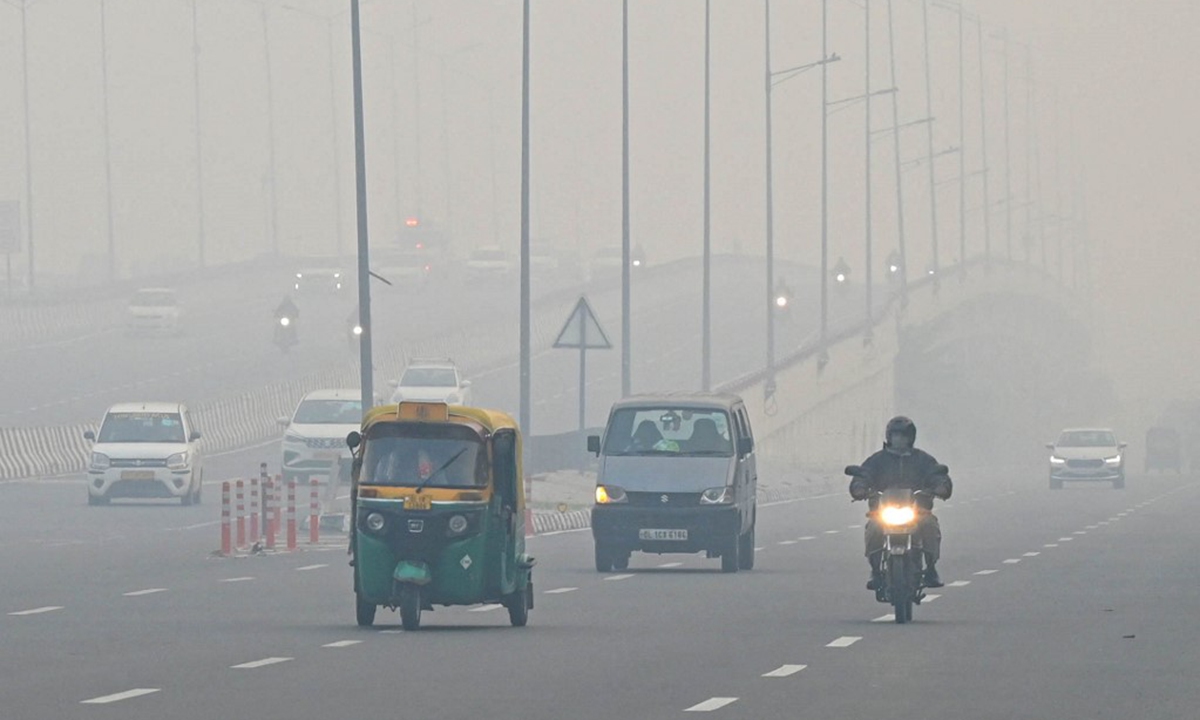test2_oem baby safety helmet south africa
时间:2024-04-04 16:15:18 出处:百科阅读(143)

The aftermath of Diwali celebrations resulted in severe pollution throughout Delhi, exacerbating the already deteriorating Air Quality crisis, in Delhi on November 13, 2023. Photo: AFP
Recently, the BBC reported that the "Indian capital lags behind Beijing in the battle to breathe." The article highlights that a range of "command-and-control measures" helped Beijing clean up its air, while Delhi's battle against air pollution stumbles due to inadequate planning, wrongly designed policies, and partisan politics.On Monday, following the Diwali festival in India, thick smoke filled the air over New Delhi due to fireworks. On the same day, the Swiss group IQAir released a ranking of the world's top 10 most polluted cities, with New Delhi once again topping the list with an Air Quality Index (AQI) of 407, classified as "hazardous." Kolkata and Mumbai, two other Indian cities, also made it to the list. In contrast, Beijing had clear blue skies and an AQI less than one-fifth of Delhi's.
New Delhi is one of the world's most polluted cities, with air quality worsening every year before the arrival of winter. Influenced by geographical and climatic factors, cold air traps pollutants from vehicles, industry, construction dust, and agricultural waste burning. Additionally, the burning of fireworks during festive occasions, weddings, and other celebrations, along with the use of wood for heating by impoverished individuals, contributes to the worsening air quality. India, heavily reliant on fossil fuels and being the third-largest emitter globally, exacerbates the air quality issues. Although India has committed to global emission reduction plans, challenges related to employment in the coal industry, supporting infrastructure, and energy transition hinder the adoption of more forceful measures.
India, with an electoral system, faces challenges in implementing effective measures as politicians at the union, state and local levels have to take into account the employment of individuals in high-carbon industries such as construction in order to woo votes.
The issue in India is not a lack of awareness but rather a lack of determination, capability, and willingness to consistently enforce emission reduction plans.
In recent years, China has waged a determined war against air pollution. First, under the United Nations Framework Convention on Climate Change, China has made significant progress in reducing carbon emissions. Second, in terms of ecological environmental governance, China has implemented continuous actions to prevent air pollution and won the battle for blue skies. Third, economically, China has promoted industrial restructuring, developed a green and low-carbon economy, and advanced clean production and energy conservation. Politically, China has enacted a series of powerful policy measures and established a sound legal system for resource and environmental protection. Culturally, China has conducted ecological civilization education across society, thereby enhancing the general public's awareness of ecological civilization. Technologically, China has continuously employed modern science and technology to control air pollution. Socially, China has established a green lifestyle, advocating for a nationwide adoption of a green way of life to reduce emissions. A study from the Energy Policy Institute at the University of Chicago reveals that from 2013 to 2020, the particulate pollution in China declined by 39.6 percent.
China and India, as the two most populous countries globally, bear significant responsibility and pressure for emission reduction. Both are major emerging and developing countries with similar development processes, providing many areas for potential cooperation in environmental issues, especially in low-political sensitivity sectors such as decarbonization technologies, including solar, wind, and hydropower.
China has achieved remarkable success in fighting pollution and protecting the environment. It has particularly gained valuable experiences in curbing hazardous smog, which India could learn from. However, in recent years, influenced by border issues, India has reduced its efforts and willingness to cooperate with China on climate issues. Faced with the pressures and economic losses caused by worsening environment, India should abandon outdated confrontational and zero-sum thinking, prioritize its own interests, protect the well-being of its people, manage its relationship with China more effectively, and enhance cooperation with China. This would be beneficial for India, maximizing the interests of the entire South Asian region, and better addressing the challenges of climate change.
分享到:
温馨提示:以上内容和图片整理于网络,仅供参考,希望对您有帮助!如有侵权行为请联系删除!
猜你喜欢
- Biden, Trump set for US election rematch after clinching nominations
- 新疆男篮发布公告:决定退出CBA,全部资产将捐赠
- 广西新增本土无症状2例 6月27日防城港东兴市疫情最新消息
- 福州部分公交站点拟更名 “双浦头”等老地名将重现公交站牌
- Car accident in Guangzhou injures 11 people; driver under control
- 中国男篮对阵伊朗大名单出炉 四进四出曾凡博入围
- 红领巾爱学习第四季第十三期题目答案 第13期线上队课答案
- 萧美琴无力帮赖清德拉拢年轻选票?沈富雄:她脑筋里的料不多
- EU’s decision to maintain anti